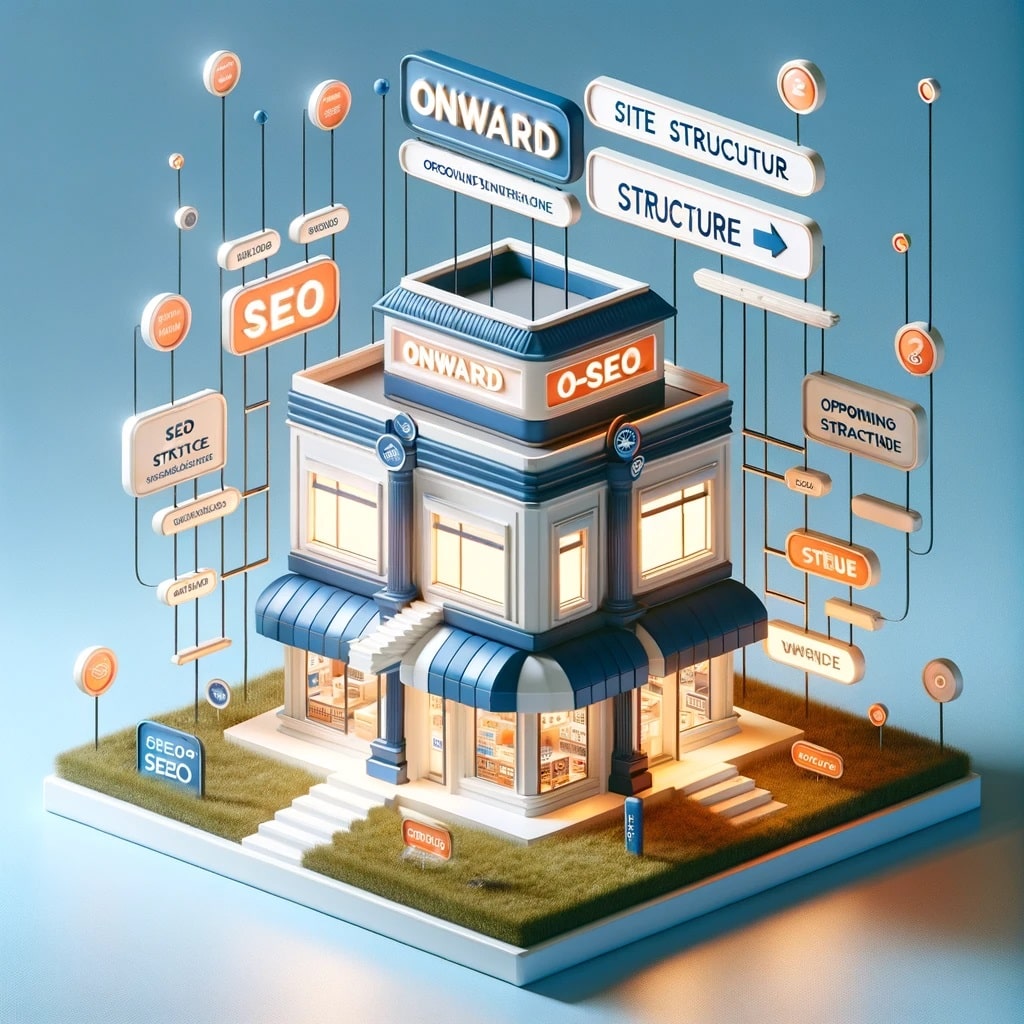Strategic Use of Sitemaps and Site Architecture in the Digital Age
In the digital age, small businesses and e-commerce websites are always competing to distinguish out in the overcrowded online marketplace. A critical weapon in this war is sometimes overlooked: the strategic use of sitemaps and site layout. This article explains how a well-organized website can dramatically improve a small business’s internet exposure. We hope to assist businesses and SME owners with practical advice and a unique viewpoint on how to use these technologies for maximum SEO benefit.
Site Structure in SEO: A Key Factor
A consistent site structure is important not only for user experience, but also for SEO success. Search engines such as Google employ site structure to comprehend and index a website’s content, making it easier for users to find you. A logically arranged website with clear hierarchies allows search engines to efficiently explore your site, which is critical for higher ranks.
For small enterprises, an ideal site structure starts with a simple navigation menu that categorizes items or services. It’s similar to a well-organized store, where everything is easily accessible. This clarity assists not just clients, but also search engines in understanding and prioritizing your content.
Furthermore, an organized internal connection approach is essential. By linking similar material, you may direct users across your site, improving engagement and time spent on the page, which are both favorable signals to search engines. This strategy also spreads ‘link equity’ throughout your site, increasing the SEO value of individual pages.
Implementing Effective Sitemaps
Sitemaps are vital for SEO because they serve as a road map for search engines to discover and index all of the pages on your website. There are two types: XML sitemaps for search engines and HTML sitemaps for end users. Small businesses should prioritize XML sitemaps, as they are critical to ensuring that all of their pages are visible to search engines.
Creating an XML sitemap is rather simple. Many internet platforms and plugins create them automatically. However, the difficulty is to maintain them up to date, particularly when new pages are added or old ones are withdrawn. It is recommended that you upload your sitemap to search engines on a regular basis using their webmaster tools.
In addition, your sitemap should prioritize important pages. Pages with high conversion rates or important content should be simple for search engines to discover and index. Remember that a sitemap is more than just a list; it is a strategic tool.
Practical Guidelines for Site Structure and Sitemap Optimization
- Establish a defined hierarchy. Your core categories should be distinct and detailed, with subclasses where necessary. Avoid intricate structures; simplicity is crucial.
- Consistent URL Structure: Make sure your URL structure matches your site hierarchy. This uniformity contributes to better indexation and user understanding.
- Breadth and Depth: Make sure your website’s breadth and depth are balanced. Too many categories can be confusing, while too few can limit your site’s SEO potential.
- Regular Sitemap Updates: Keep your XML sitemap current. When you add or remove a page, make sure your sitemap reflects the changes.
- Use Tools and Plugins: Google Search Console and other CMS plugins can automate sitemap building and submission, making the process more efficient.
- Monitor and adapt: Conduct regular performance checks on your website. Use analytics to learn how users traverse your site and alter its structure and sitemap accordingly.
Deep Dive into Website Structure for E-commerce
An intuitive and well-structured website is not only advantageous, but also essential for e-commerce businesses. The structure of your e-commerce site has a direct impact on user experience, search engine rankings, and, eventually, sales conversions. Here is how a good structure can make a difference:
- Enhanced User Experience: A well-organized e-commerce site directs customers from the homepage to product pages, and eventually to the checkout. A well-thought-out structure reduces consumer dissatisfaction, lowers bounce rates, and raises the possibility of return visits and purchases.
- Improved Search Engine Visibility: Search engines prefer websites that have a clear structure. A well-organized e-commerce site with optimized category and product pages improves crawlability, allowing search engines to index your material and present it in search results.
- Efficient Scalability: As your inventory grows, a solid website structure allows you to scale effectively. You may add new categories and goods while maintaining the existing hierarchy and user experience, which is critical for long-term growth.
Practical Website Structure Tips for E-Commerce
- Logical Product Categorization: Classify your products into logical categories and subcategories. For example, a clothes store might contain categories like ‘Men’, ‘Women’, and ‘Kids’, as well as subcategories like ‘Tops’, ‘Bottoms’, and ‘Accessories’.
- Clear Navigation Paths: Make sure your navigation menu is straightforward to understand and use. Use breadcrumb navigation to assist people keep track of their location on your website.
- Optimized Product Pages: Each product page should be search engine optimized, including distinctive titles, descriptions, and high-quality photos. Include useful keywords without cramming.
- Mobile Responsiveness: With the growing popularity of smartphones for purchasing, make sure your e-commerce website is mobile-friendly. A responsive design adjusts to different screen sizes, enhancing the user experience and SEO.
- Use high-quality, unique material in your product descriptions and category pages. Engaging and useful content can boost search rankings and increase customer engagement.
- Speed and Performance: A quick-loading website is essential for e-commerce. To increase site speed, optimize photos, cache them, and consider using a content delivery network (CDN).
- SEO-Friendly URLs: Create clear, descriptive URLs for your sites. Use /men/tops/t-shirts, rather than /product?id=12345. This enhances both user experience and search engine rankings.
- Implement Structured Data: Provide extensive product information to search engines using schema markup. This can improve your look in search results by including rich snippets, potentially raising click-through rates.
Technical SEO and Its Importance in E-commerce Website Architecture
Technical SEO is an essential component of any successful e-commerce site. It entails optimizing your site’s infrastructure to make it more search engine friendly and increase user experience. A technically competent website not only ranks higher, but also offers users a more fluid buying experience. Here are some important features of technical SEO for e-commerce websites:
- Website Speed Optimization: Online shoppers are impatient. A few seconds’ delay in page load can result in missed sales. To increase site speed, optimize your pictures, use browser caching, and reduce the number of HTTP queries.
- Mobile Optimization: With mobile commerce quickly expanding, having a mobile-optimized website is critical. Ensure that your website is responsive, and consider using Accelerated Mobile Pages (AMP) for faster loading on mobile devices.
- Secure Sockets Layer (SSL) Certification: Security is critical in e-commerce. An SSL certificate encrypts data exchanged between your website and its users, which is critical for protecting sensitive client information and establishing trust.
- Clean and Structured Code: A clean codebase allows search engines to crawl your site more efficiently. Use common coding principles and keep your HTML free of needless components.
- Error Management: Check for broken links and 404 errors regularly and fix them. These not only degrade the user experience but also lower your search engine rankings.
- Canonical Tags: Use canonical tags to prevent duplicating information, especially if your products are offered in various categories.
Developing a Strong Website Architecture for E-Commerce
A good and SEO optimized website architecture is the foundation of any e-commerce site. It not only improves the user experience but also helps your SEO efforts. Here’s how to construct a resilient architecture:
- Logical Hierarchy and Navigation: Build your website using a logical hierarchy. The main categories should be easily accessible from the site, with subcategories and products neatly grouped below them.
- Breadcrumb Navigation: Use breadcrumb navigation to help users find their way back to the homepage. This not only improves the user experience, but it also helps search engines grasp your site’s structure.
- Optimized Category Pages: Category pages serve more than just product listings. Optimize them with unique content and relevant keywords to create a positive user experience.
- Effective Internal Linking: Connect relevant items and categories on your site. This not only helps to distribute page authority, but also helps users discover new products.
- Focus on User Experience: Make sure your site architecture is developed with the user in mind. Easy navigation, clear calls to action, and a simple checkout procedure can all improve the purchasing experience.
- Scalability: As your business expands, your website should be able to add new goods and categories without requiring a major redesign. Develop with the future in mind.
Expert Advice on Website Structure and Technical SEO
The world of e-commerce is extremely competitive, and understanding the art of site construction and technical SEO is critical to success. Here, industry experts share their ideas, providing useful viewpoints to help e-commerce businesses improve their online presence.
Jane Smith, SEO Consultant at EcomSEO Inc., notes, “A well-planned site structure is like a map for both users and search engines. It is not only important to consider how your website looks, but also how it delivers its content. A logical flow from homepage to product page not only improves user experience, but also makes indexing easier for search engines.”
According to Mike Johnson, Senior SEO Strategist at Digital Solutions, “intuitive navigation is the key to a successful e-commerce site. If clients cannot locate what they are looking for only a few clicks, they are likely to depart. This is why a clear, hierarchical structure that reflects the customer’s thought process is critical.”
Emily Carter, Head of SEO at WebTech Group, states, “Technical SEO may appear difficult, but it is the foundation upon which all other SEO efforts are constructed. Concentrate on the fundamentals: website performance, mobile optimization, and secure, clean coding. These are more than just ranking factors; they’re critical to ensuring a great user experience.”
According to David Lee, CTO at NextGen Marketing, “In today’s mobile-first world, ignoring mobile optimization is equivalent to closing your store to half your potential customers. Mobile-friendliness is an important aspect of technical SEO that affects both search rankings and user pleasure.”
According to Rachel Green, Director of SEO at Omni Digital, “SEO is a continuous process rather than a one-time setup. Regular audits, staying current with algorithm updates, and adjusting your approach are essential for remaining ahead in the competitive e-commerce industry.”
Kevin Brown, an E-commerce SEO Specialist, comments, “Remember, SEO is about improving your site for both search engines and human users. Balancing technical optimization with a user-centric strategy will boost both rankings and conversions.”
Conclusion
To summarize, e-commerce websites may genuinely shine when they combine technical SEO with well-crafted website architecture. E-commerce enterprises can dramatically improve their online presence by focusing on site performance, mobile optimization, secure browsing, and logical site structure. Investing in these areas not only improves the user experience but also boosts organic traffic, resulting in greater sales and client loyalty. Remember that in the competitive world of e-commerce, even the slightest things in website optimization can make a major impact.
About the Author:
With over 14 years of seasoned expertise in Technical SEO consulting, Eugen Platon SEO Expert stands at the forefront of the evolving digital marketing landscape. His approach to Technical SEO (search engine optimization) is both comprehensive and bespoke, ensuring that each technical SEO project he undertakes is finely tuned to its unique requirements and goals. He excels in elevating website visibility, bolstering user engagement, and navigating the ever-changing currents of SEO. Under his guidance, your online presence is transformed into a dynamic digital force, adeptly meeting and surpassing set objectives. Eugen combines time-tested SEO strategies with cutting-edge AI powered SEO techniques, dedicating himself to transforming your digital footprint into a magnet for both search engines and your target audience. Embark on a journey with him to unlock the full SEO potential of your online presence.


